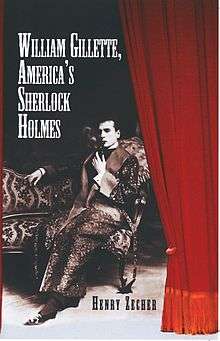William Gillette, America's Sherlock Holmes
 | |
| Author | Henry Zecher |
|---|---|
| Country | United States |
| Language | English |
| Genre | Biography |
| Publisher | Xlibris Press |
Publication date | 2011 |
| Media type | Electronic Ebook |
| Pages | 733 |
| ISBN | 978-1-4535-5581-1 (hardback) |
William Gillette, America's Sherlock Holmes, by Henry Zecher, is the first full and in-depth biography of William Hooker Gillette (1853–1937), the American actor, playwright and stage-manager of the late nineteenth and early twentieth centuries who is best remembered today for portraying Sherlock Holmes.
Gillette was among the first American playwrights to offer tightly-knit and well-constructed plays, Bronson Howard, Steele MacKaye and James Herne being the others, but his most significant contributions to the theater were in devising realistic stage settings and special sound and lighting effects, and, as an actor, in putting forth what he called The Illusion of the First Time. His portrayal of Holmes helped create the modern image of the detective. His use of the deerstalker cap (which first appeared in some Strand Magazine illustrations by Sidney Paget) and the curved pipe became synonymous with the character.[1] And it was in his play, not in Arthur Conan Doyle's stories, that Holmes first said "This is elementary, my dear fellow," which subsequently became "Elementary, my dear Watson".[2] Gillette assumed the role onstage more than 1,300 times over thirty years, starred in a silent motion picture based on his Holmes play, and voiced the character twice on radio.[3]
The author is a graduate of the University of Maryland School of Journalism, Class of 1971. He was an award-winning sports writer and sports editor of the Delaware State News in Dover, Delaware, before embarking on a career in Federal government human resources. He has worked as a free-lance writer for many years and published a number of magazine articles, two of them of historical importance. One was an evaluation of German Reformer Martin Luther's impact on the English Bible,[4] and the other was the first analysis from a biblical and historical point of view of the Ipuwer Papyrus, first claimed by Immanuel Velikovsky and subsequently by others to have been an Egyptian version of the plagues on Egypt described in the Old Testament Book of Exodus.[5]
This is Zecher's first book. It contains 585 pages of text and is profusely illustrated with more than ninety images, nearly all of them containing two to four and, in two cases, six individual photographs. It contains a bibliography of Gillette's writings, a list of his plays subsequently made into motion pictures, a list of his patents, a list of audio/visual recordings of his voice, and 97 pages of Endnotes.
References
- ↑ Zecher, Henry, William Gillette, America's Sherlock Holmes (Xlibris Press, 2011), pp. 7, 9, 28, 328, 581
- ↑ Zecher, Henry, William Gillette, America's Sherlock Holmes, p. 655
- ↑ Zecher, Henry, William Gillette, America's Sherlock Holmes, pp. 531-535, 555-557, 582
- ↑ Zecher, Henry, "How One Man's Pen Changed the World," Christianity Today Magazine, Volume 27, No. 16, October 23, 1983, pp. 10-13; republished several more times, recorded for the blind, and finally included in Christian History Magazine's special Martin Luther issue; "The Bible Translation That Rocked The World," Christian History Magazine, Issue 34, Volume XI, No. 2, pp. 35-37
- ↑ Zecher, Henry, "The Papyrus Ipuwer, Egyptian Version of the Plagues - A New Perspective," The Velikovskian, A Journal of Myth, History and Science, Vol. III, No. 1, January 1997, pp. 91-126